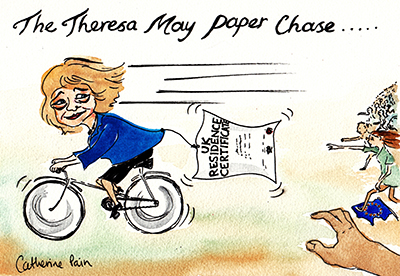 Britain’s vote to leave the European Union has left many EU citizens currently living in the UK with a question mark over their future. Some believe that paperwork will help secure their fate – and are rushing to prove that they have a permanent right to stay in the UK.
Britain’s vote to leave the European Union has left many EU citizens currently living in the UK with a question mark over their future. Some believe that paperwork will help secure their fate – and are rushing to prove that they have a permanent right to stay in the UK.
Permanent residency is a legal status granted automatically to EU nationals after five years of lawful residence in the UK. But those eligible can also apply for a residence certificate or document certifying permanent residency which serves as official proof.
There is an expectation that the Brexit vote will spark a rise in applications from among those 3.5m EU citizens living in the UK who are eligible for permanent residence. The Home Office is reportedly trialling a new online system to deal with a spike in applications – and to make the process less time-consuming.
Theresa May has said restricting immigration will be at the heart of Brexit deal. So it is likely that the UK government will try to impose new restrictions on travel between the UK and Europe for those EU nationals without a permanent right to stay. Written proof of a permanent right to stay in the country could become a key part of border control – as it already is for non-EU citizens with a permanent right to remain.
Applications on the up
As they wait for post-referendum migration statistics to emerge, the government has been preparing in order to avoid a backlog. Data from before the referendum showed a rise in applications.
During the first two quarters of 2016, official data showed that the government received 64,282 valid applications by citizens of the European Economic Area (which includes EU countries as well as Norway, Iceland and Liechenstein) looking for a document certifying their permanent resident. It’s not possible to put these statistic down to uncertainty about the referendum, particularly as the law requires those EU nationals seeking to apply for British citizenship to first prove their permanent right to reside – which may well explain an increase in applications.
Of the applications in the first six months of the year, 17,074 of those were refused, meaning a success rate of 73%. There are various reasons applications may fail, previous criminal conviction being one. But EU nationals are most likely to struggle to provide the documents proving their lawful residence in the UK for five years
For EU students who are living in the UK and want to apply for a right to reside, their time living in the UK as a student counts towards their five years. But they will have to fulfil additional criteria during their studies, such as making sure they have the right health insurance coverage, or declaring formally that they are able to support themselves without state assistance.
This means that students who have spent three years studying in the UK as an undergraduate, will only be able to count these years towards their eligibility for residency if they fulfil the additional criteria. If they don’t, they may need to wait until they have lived in the UK for five years after they finish studying.
Will the document help?
So far, the status of EU nationals has not changed and it’s still unclear what role the status of permanent residency for EU nationals will play after the withdrawal from the EU. But it is possible that the government could require all EU nationals who are eligible for permanent residency to get a certificate to prove it, a little like an additional passport.
Having written proof of the permanent right to stay already simplifies applications for benefits but may well become essential. There are other situations in which EU nationals could face the additional burden of having to show written proof of their residency rights including mortgages, education or training.
Additionally, considering the situation for spouses (some who may be non-EU nationals) and children, the amount of applications could quickly pile up. All family members will have to fill in a separate form for residency paperwork, although they can put in their applications as a family group.
The clout of these bits of paper will depend on the agreement reached between Brexit and EU negotiators. But what’s clear is those who had the right to reside in the UK before June 23 – even if they did not have a piece of paper to prove it – are protected by the rule of law. A retrospective change of requirements to be granted the permanent right to reside would not only be unlawful in international law, but under UK law, too.
This article was originally published on The Conversation. Read the original article.
This blog post is part of Society Matters. The blog seeks to inform, stimulate and challenge our understanding of this changing world and of our humbling role within it.
Want to know more about studying social sciences at The Open University? Visit the Social Sciences faculty site.
Please note: The opinions expressed in Society Matters posts are those of the individual authors, and do not represent the views of The Open University.
Rate and Review
Rate this article
Review this article
Log into OpenLearn to leave reviews and join in the conversation.
Article reviews